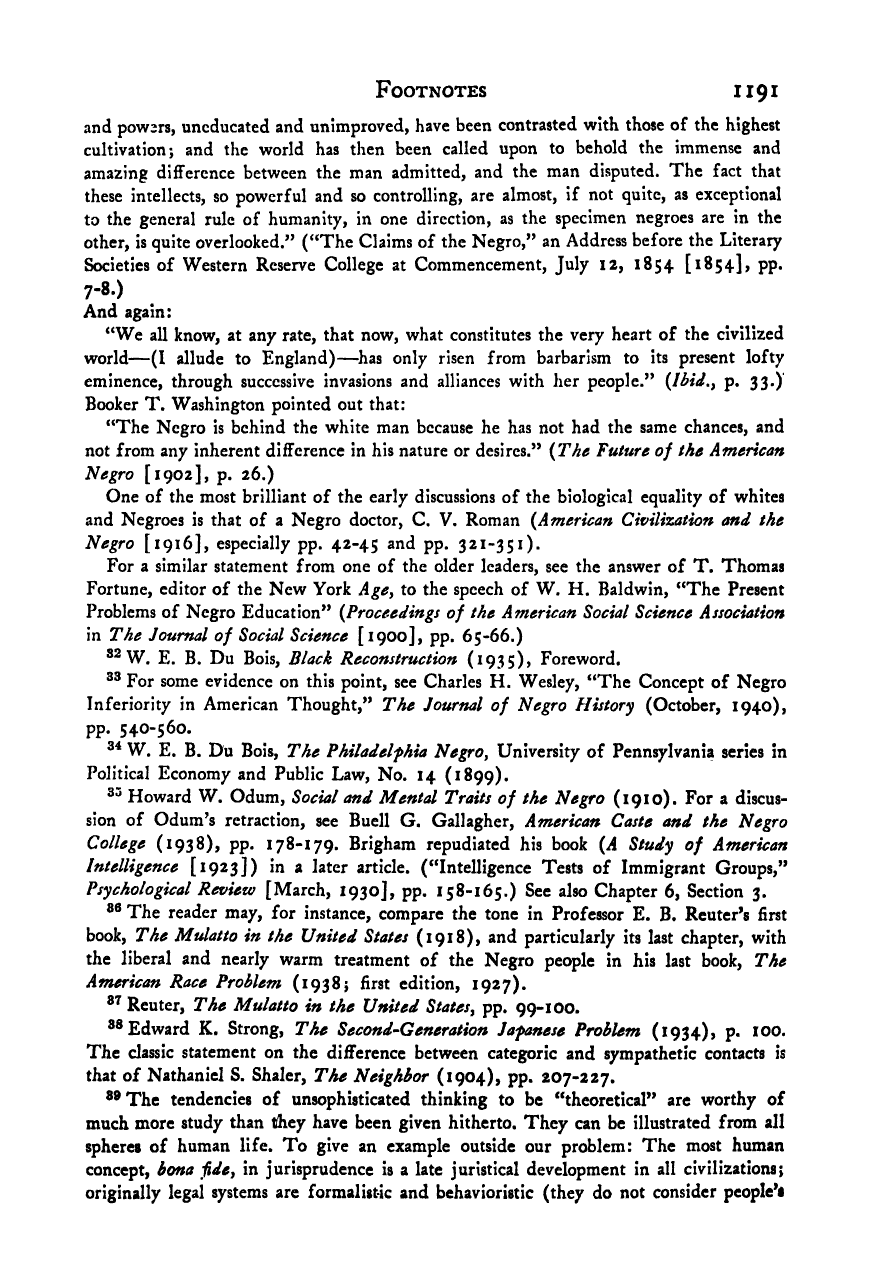Note: Gunnar Myrdal died in 1987, less than 70 years ago. Therefore, this work is protected by copyright, restricting your legal rights to reproduce it. However, you are welcome to view it on screen, as you do now. Read more about copyright.
Full resolution (TIFF) - On this page / på denna sida - Footnotes - Chapter 4

<< prev. page << föreg. sida << >> nästa sida >> next page >>
Below is the raw OCR text
from the above scanned image.
Do you see an error? Proofread the page now!
Här nedan syns maskintolkade texten från faksimilbilden ovan.
Ser du något fel? Korrekturläs sidan nu!
This page has never been proofread. / Denna sida har aldrig korrekturlästs.
Footnotes 1191
and powers, uneducated and unimproved, have been contrasted with those of the highest
cultivation; and the world has then been called upon to behold the immense and
amazing difference between the man admitted, and the man disputed. The fact that
these intellects, so powerful and so controlling, are almost, if not quite, as exceptional
to the general rule of humanity, in one direction, as the specimen negroes are in the
other, is quite overlooked.” (“The Claims of the Negro,” an Address before the Literary
Societies of Western Reserve College at Commencement, July 12, 1854 [1854], pp.
7
-8.)
And again:
“We all know, at any rate, that now, what constitutes the very heart of the civilized
world—(I allude to England)—^has only risen from barbarism to its present lofty
eminence, through successive invasions and alliances with her people.” {lbid,y p. 33.)
Booker T. Washington pointed out that:
“The Negro is behind the white man because he has not had the same chances, and
not from any inherent difference in his nature or desires.” {Thfi Future of the American
Negro [1902], p. 26.)
One of the most brilliant of the early discussions of the biological equality of whites
and Negroes is that of a Negro doctor, C. V. Roman {^American Civilization and the
Negro [1916], especially pp. 42-45 and pp. 321-35 1).
For a similar statement from one of the older leaders, see the answer of T. Thomas
Fortune, editor of the New York Agey to the speech of W. H. Baldwin, “The Present
Problems of Negro Education” {Proceedings of the American Social Science Association
in The Journal of Social Science [1900], pp. 65-66.)
W. E. B. Du Bois, Black Reconstruction (1935), Foreword.
For some evidence on this point, see Charles H. Wesley, “The Concept of Negro
Inferiority in American Thought,” The Journal of Negro History (October, 1940),
pp. 540-560.
W. E. B. Du Bois, The Philadelphia Negro, University of Pennsylvania series in
Political Economy and Public Law, No. 14 (1899).
Howard W. Odum, Social and Mental Traits of the Negro (1910). For a discus-
sion of Odum’s retraction, see Buell G. Gallagher, American Caste and the Negro
College (1938), pp. 178-179. Brigham repudiated his book {A Study of American
Intelligence [1923]) in a later article. (“Intelligence Tests of Immigrant Groups,”
Psychological Review [March, 1930], pp. 158-165.) See also Chapter 6, Section 3.
The reader may, for instance, compare the tone in Professor E. B. Reuter’s first
book. The Mulatto in the United States (1918), and particularly its last chapter, with
the liberal and nearly warm treatment of the Negro people in his last book, The
American Race Problem (1938; first edition, 1927).
Reuter, The Mulatto in the United States pp. 99-100.
Edward K. Strong, The Second’-Generation Japanese Problem (1934), p. lOO.
The classic statement on the difference between categoric and sympathetic contacts is
that of Nathaniel S. Shaler, The Neighbor (1904), pp. 207-227.
®®The tendencies of unsophisticated thinking to be “theoretical” are worthy of
much more study than they have been given hitherto. They can be illustrated from all
spheres of human life. To give an example outside our problem: The most human
concept, bona fidcy in jurisprudence is a late juristical development in all civilizations;
originally legal systems are formalistic and behavioristic (they do not consider people’s
<< prev. page << föreg. sida << >> nästa sida >> next page >>